Advance Corporate Accounting: IFRS Adoption and US GAAP Comparison
VerifiedAdded on 2022/11/01
|7
|1460
|245
Essay
AI Summary
This assignment explores the effects of International Financial Reporting Standards (IFRS) adoption on the quality of corporate reporting, particularly in Australia and the European Union. It investigates improvements in financial statement reliability and comparability post-IFRS implementation, considering the perspectives of investors, business partners, and decision-makers. The essay also analyzes the reasons behind the Financial Accounting Standards Board (FASB) not adopting IFRS in the United States, focusing on statutory requirements, investor protection, and the costs of transitioning from US Generally Accepted Accounting Principles (GAAP). It highlights the ongoing debate between IFRS and GAAP, acknowledging their respective advantages and disadvantages in the context of global financial reporting and economic development. The conclusion underscores the importance of standardized financial reporting for investor confidence, risk assessment, and efficient capital allocation.
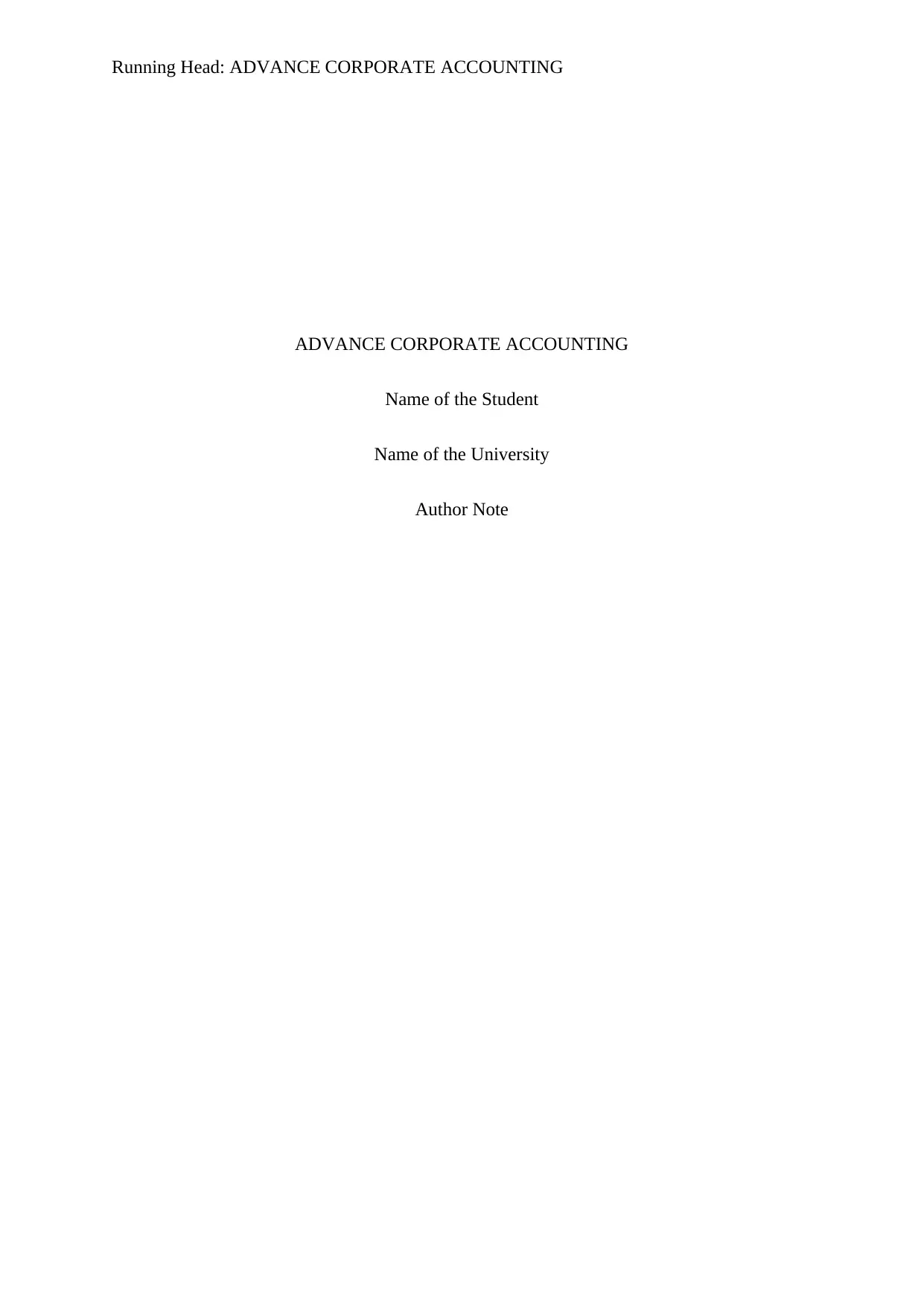
Running Head: ADVANCE CORPORATE ACCOUNTING
ADVANCE CORPORATE ACCOUNTING
Name of the Student
Name of the University
Author Note
ADVANCE CORPORATE ACCOUNTING
Name of the Student
Name of the University
Author Note
Paraphrase This Document
Need a fresh take? Get an instant paraphrase of this document with our AI Paraphraser
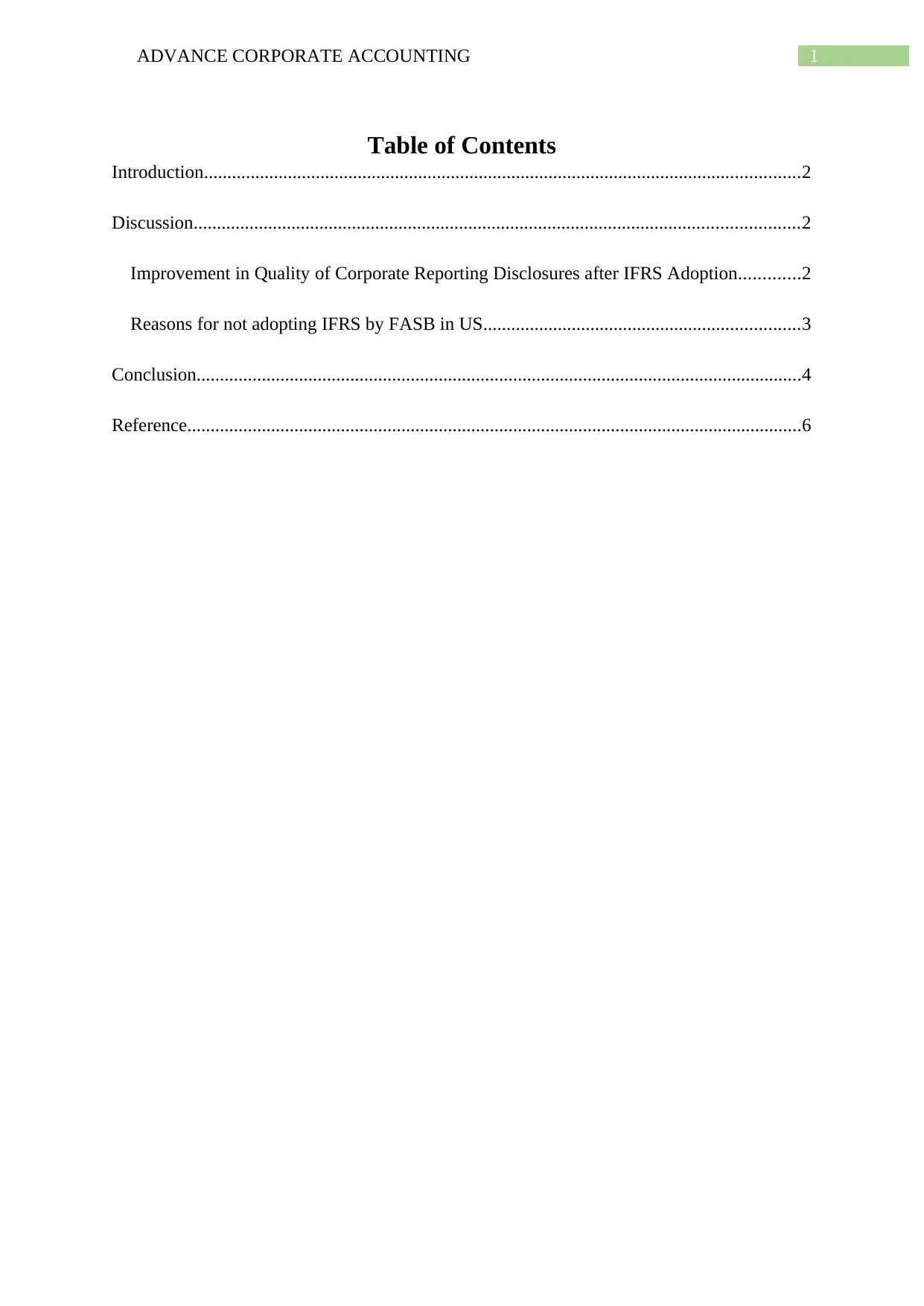
1ADVANCE CORPORATE ACCOUNTING
Table of Contents
Introduction................................................................................................................................2
Discussion..................................................................................................................................2
Improvement in Quality of Corporate Reporting Disclosures after IFRS Adoption.............2
Reasons for not adopting IFRS by FASB in US....................................................................3
Conclusion..................................................................................................................................4
Reference....................................................................................................................................6
Table of Contents
Introduction................................................................................................................................2
Discussion..................................................................................................................................2
Improvement in Quality of Corporate Reporting Disclosures after IFRS Adoption.............2
Reasons for not adopting IFRS by FASB in US....................................................................3
Conclusion..................................................................................................................................4
Reference....................................................................................................................................6
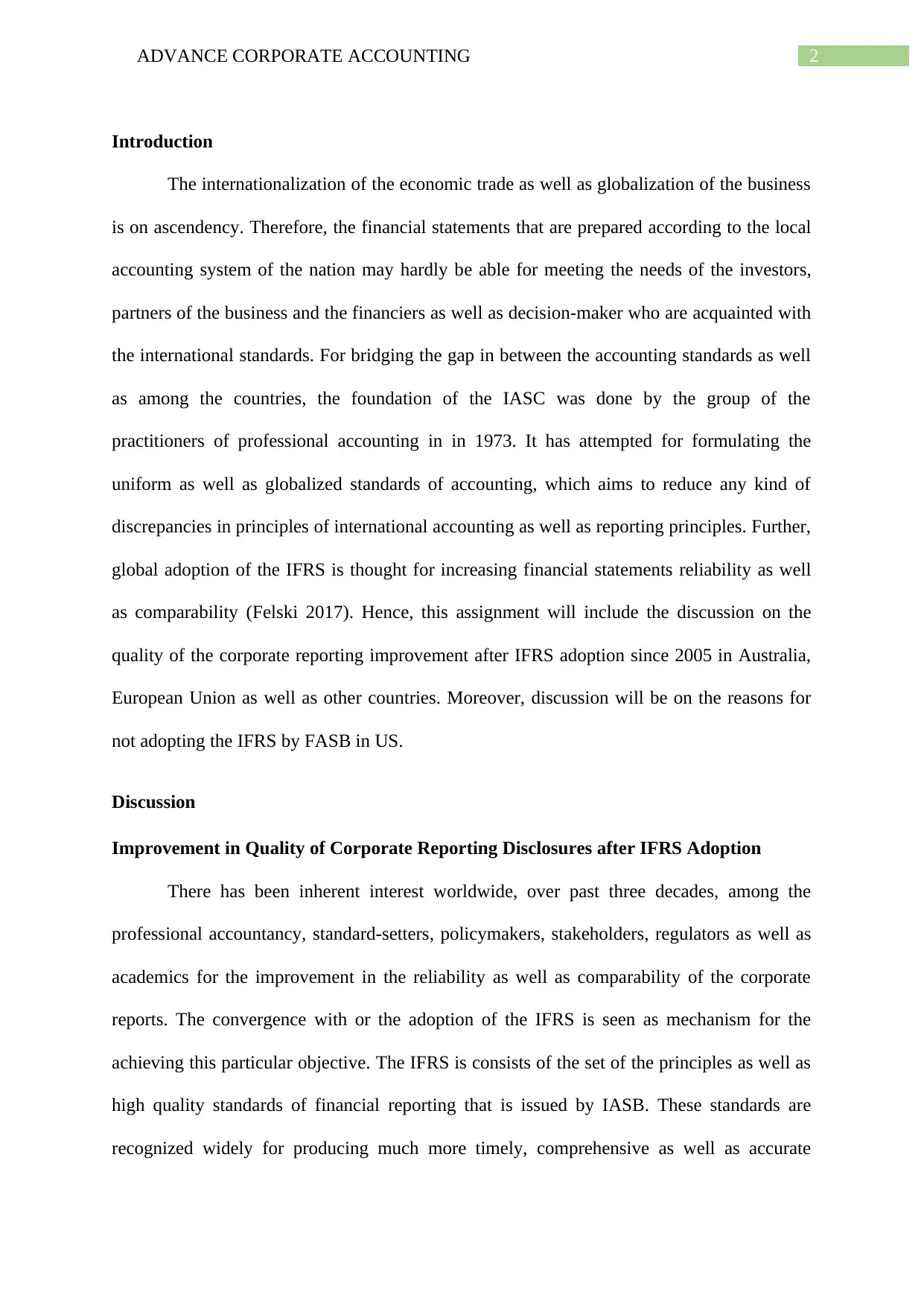
2ADVANCE CORPORATE ACCOUNTING
Introduction
The internationalization of the economic trade as well as globalization of the business
is on ascendency. Therefore, the financial statements that are prepared according to the local
accounting system of the nation may hardly be able for meeting the needs of the investors,
partners of the business and the financiers as well as decision-maker who are acquainted with
the international standards. For bridging the gap in between the accounting standards as well
as among the countries, the foundation of the IASC was done by the group of the
practitioners of professional accounting in in 1973. It has attempted for formulating the
uniform as well as globalized standards of accounting, which aims to reduce any kind of
discrepancies in principles of international accounting as well as reporting principles. Further,
global adoption of the IFRS is thought for increasing financial statements reliability as well
as comparability (Felski 2017). Hence, this assignment will include the discussion on the
quality of the corporate reporting improvement after IFRS adoption since 2005 in Australia,
European Union as well as other countries. Moreover, discussion will be on the reasons for
not adopting the IFRS by FASB in US.
Discussion
Improvement in Quality of Corporate Reporting Disclosures after IFRS Adoption
There has been inherent interest worldwide, over past three decades, among the
professional accountancy, standard-setters, policymakers, stakeholders, regulators as well as
academics for the improvement in the reliability as well as comparability of the corporate
reports. The convergence with or the adoption of the IFRS is seen as mechanism for the
achieving this particular objective. The IFRS is consists of the set of the principles as well as
high quality standards of financial reporting that is issued by IASB. These standards are
recognized widely for producing much more timely, comprehensive as well as accurate
Introduction
The internationalization of the economic trade as well as globalization of the business
is on ascendency. Therefore, the financial statements that are prepared according to the local
accounting system of the nation may hardly be able for meeting the needs of the investors,
partners of the business and the financiers as well as decision-maker who are acquainted with
the international standards. For bridging the gap in between the accounting standards as well
as among the countries, the foundation of the IASC was done by the group of the
practitioners of professional accounting in in 1973. It has attempted for formulating the
uniform as well as globalized standards of accounting, which aims to reduce any kind of
discrepancies in principles of international accounting as well as reporting principles. Further,
global adoption of the IFRS is thought for increasing financial statements reliability as well
as comparability (Felski 2017). Hence, this assignment will include the discussion on the
quality of the corporate reporting improvement after IFRS adoption since 2005 in Australia,
European Union as well as other countries. Moreover, discussion will be on the reasons for
not adopting the IFRS by FASB in US.
Discussion
Improvement in Quality of Corporate Reporting Disclosures after IFRS Adoption
There has been inherent interest worldwide, over past three decades, among the
professional accountancy, standard-setters, policymakers, stakeholders, regulators as well as
academics for the improvement in the reliability as well as comparability of the corporate
reports. The convergence with or the adoption of the IFRS is seen as mechanism for the
achieving this particular objective. The IFRS is consists of the set of the principles as well as
high quality standards of financial reporting that is issued by IASB. These standards are
recognized widely for producing much more timely, comprehensive as well as accurate
⊘ This is a preview!⊘
Do you want full access?
Subscribe today to unlock all pages.

Trusted by 1+ million students worldwide
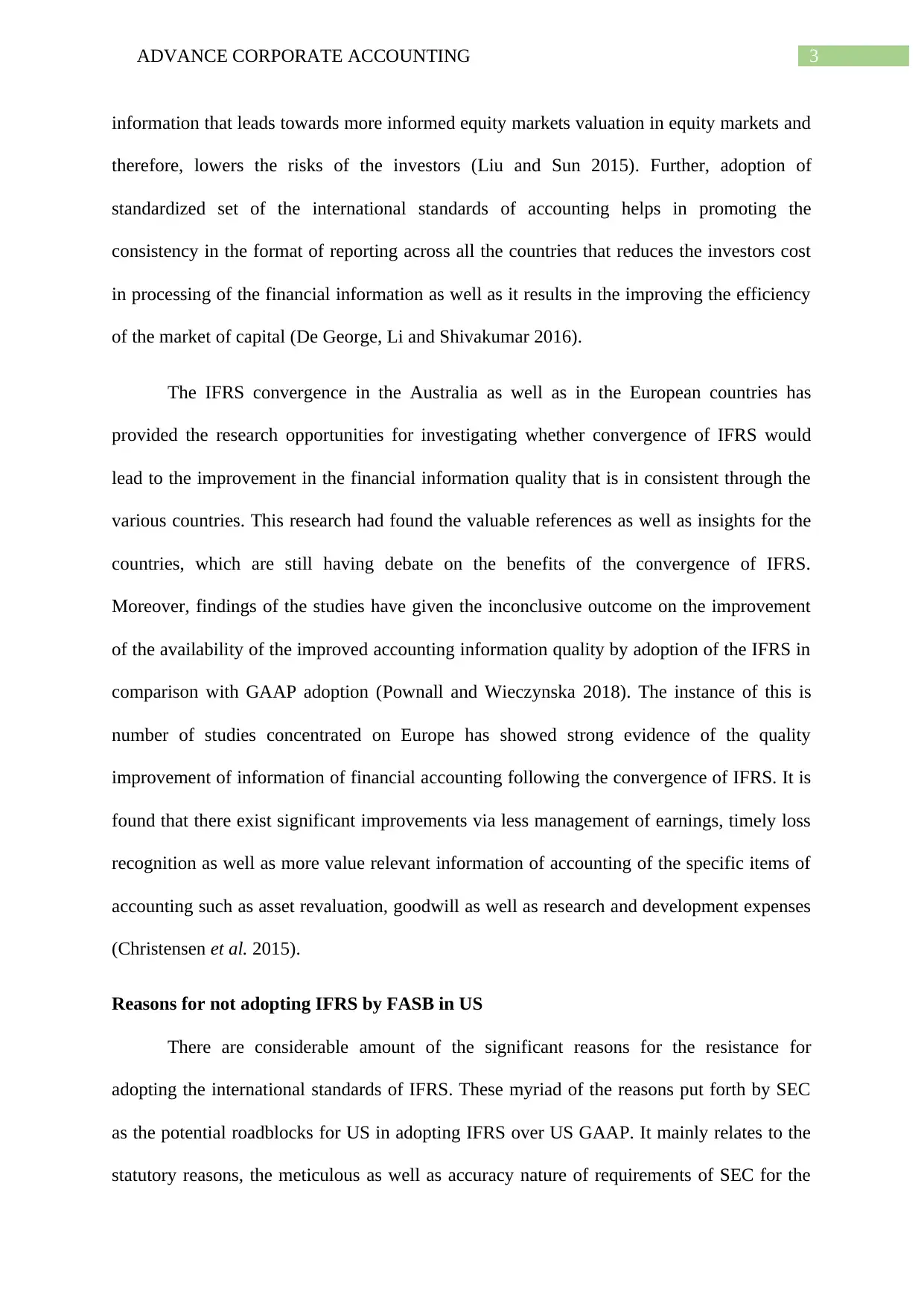
3ADVANCE CORPORATE ACCOUNTING
information that leads towards more informed equity markets valuation in equity markets and
therefore, lowers the risks of the investors (Liu and Sun 2015). Further, adoption of
standardized set of the international standards of accounting helps in promoting the
consistency in the format of reporting across all the countries that reduces the investors cost
in processing of the financial information as well as it results in the improving the efficiency
of the market of capital (De George, Li and Shivakumar 2016).
The IFRS convergence in the Australia as well as in the European countries has
provided the research opportunities for investigating whether convergence of IFRS would
lead to the improvement in the financial information quality that is in consistent through the
various countries. This research had found the valuable references as well as insights for the
countries, which are still having debate on the benefits of the convergence of IFRS.
Moreover, findings of the studies have given the inconclusive outcome on the improvement
of the availability of the improved accounting information quality by adoption of the IFRS in
comparison with GAAP adoption (Pownall and Wieczynska 2018). The instance of this is
number of studies concentrated on Europe has showed strong evidence of the quality
improvement of information of financial accounting following the convergence of IFRS. It is
found that there exist significant improvements via less management of earnings, timely loss
recognition as well as more value relevant information of accounting of the specific items of
accounting such as asset revaluation, goodwill as well as research and development expenses
(Christensen et al. 2015).
Reasons for not adopting IFRS by FASB in US
There are considerable amount of the significant reasons for the resistance for
adopting the international standards of IFRS. These myriad of the reasons put forth by SEC
as the potential roadblocks for US in adopting IFRS over US GAAP. It mainly relates to the
statutory reasons, the meticulous as well as accuracy nature of requirements of SEC for the
information that leads towards more informed equity markets valuation in equity markets and
therefore, lowers the risks of the investors (Liu and Sun 2015). Further, adoption of
standardized set of the international standards of accounting helps in promoting the
consistency in the format of reporting across all the countries that reduces the investors cost
in processing of the financial information as well as it results in the improving the efficiency
of the market of capital (De George, Li and Shivakumar 2016).
The IFRS convergence in the Australia as well as in the European countries has
provided the research opportunities for investigating whether convergence of IFRS would
lead to the improvement in the financial information quality that is in consistent through the
various countries. This research had found the valuable references as well as insights for the
countries, which are still having debate on the benefits of the convergence of IFRS.
Moreover, findings of the studies have given the inconclusive outcome on the improvement
of the availability of the improved accounting information quality by adoption of the IFRS in
comparison with GAAP adoption (Pownall and Wieczynska 2018). The instance of this is
number of studies concentrated on Europe has showed strong evidence of the quality
improvement of information of financial accounting following the convergence of IFRS. It is
found that there exist significant improvements via less management of earnings, timely loss
recognition as well as more value relevant information of accounting of the specific items of
accounting such as asset revaluation, goodwill as well as research and development expenses
(Christensen et al. 2015).
Reasons for not adopting IFRS by FASB in US
There are considerable amount of the significant reasons for the resistance for
adopting the international standards of IFRS. These myriad of the reasons put forth by SEC
as the potential roadblocks for US in adopting IFRS over US GAAP. It mainly relates to the
statutory reasons, the meticulous as well as accuracy nature of requirements of SEC for the
Paraphrase This Document
Need a fresh take? Get an instant paraphrase of this document with our AI Paraphraser
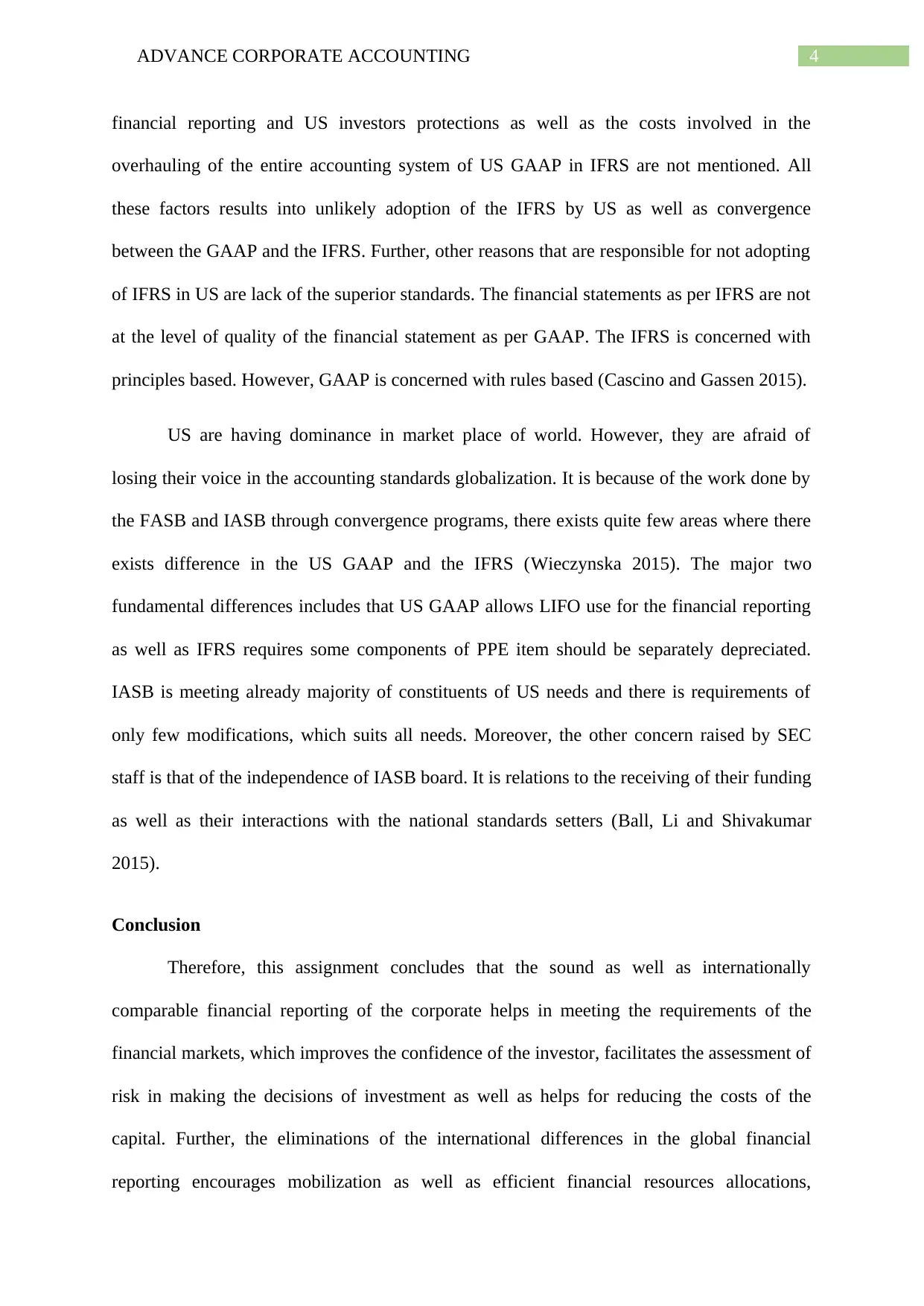
4ADVANCE CORPORATE ACCOUNTING
financial reporting and US investors protections as well as the costs involved in the
overhauling of the entire accounting system of US GAAP in IFRS are not mentioned. All
these factors results into unlikely adoption of the IFRS by US as well as convergence
between the GAAP and the IFRS. Further, other reasons that are responsible for not adopting
of IFRS in US are lack of the superior standards. The financial statements as per IFRS are not
at the level of quality of the financial statement as per GAAP. The IFRS is concerned with
principles based. However, GAAP is concerned with rules based (Cascino and Gassen 2015).
US are having dominance in market place of world. However, they are afraid of
losing their voice in the accounting standards globalization. It is because of the work done by
the FASB and IASB through convergence programs, there exists quite few areas where there
exists difference in the US GAAP and the IFRS (Wieczynska 2015). The major two
fundamental differences includes that US GAAP allows LIFO use for the financial reporting
as well as IFRS requires some components of PPE item should be separately depreciated.
IASB is meeting already majority of constituents of US needs and there is requirements of
only few modifications, which suits all needs. Moreover, the other concern raised by SEC
staff is that of the independence of IASB board. It is relations to the receiving of their funding
as well as their interactions with the national standards setters (Ball, Li and Shivakumar
2015).
Conclusion
Therefore, this assignment concludes that the sound as well as internationally
comparable financial reporting of the corporate helps in meeting the requirements of the
financial markets, which improves the confidence of the investor, facilitates the assessment of
risk in making the decisions of investment as well as helps for reducing the costs of the
capital. Further, the eliminations of the international differences in the global financial
reporting encourages mobilization as well as efficient financial resources allocations,
financial reporting and US investors protections as well as the costs involved in the
overhauling of the entire accounting system of US GAAP in IFRS are not mentioned. All
these factors results into unlikely adoption of the IFRS by US as well as convergence
between the GAAP and the IFRS. Further, other reasons that are responsible for not adopting
of IFRS in US are lack of the superior standards. The financial statements as per IFRS are not
at the level of quality of the financial statement as per GAAP. The IFRS is concerned with
principles based. However, GAAP is concerned with rules based (Cascino and Gassen 2015).
US are having dominance in market place of world. However, they are afraid of
losing their voice in the accounting standards globalization. It is because of the work done by
the FASB and IASB through convergence programs, there exists quite few areas where there
exists difference in the US GAAP and the IFRS (Wieczynska 2015). The major two
fundamental differences includes that US GAAP allows LIFO use for the financial reporting
as well as IFRS requires some components of PPE item should be separately depreciated.
IASB is meeting already majority of constituents of US needs and there is requirements of
only few modifications, which suits all needs. Moreover, the other concern raised by SEC
staff is that of the independence of IASB board. It is relations to the receiving of their funding
as well as their interactions with the national standards setters (Ball, Li and Shivakumar
2015).
Conclusion
Therefore, this assignment concludes that the sound as well as internationally
comparable financial reporting of the corporate helps in meeting the requirements of the
financial markets, which improves the confidence of the investor, facilitates the assessment of
risk in making the decisions of investment as well as helps for reducing the costs of the
capital. Further, the eliminations of the international differences in the global financial
reporting encourages mobilization as well as efficient financial resources allocations,
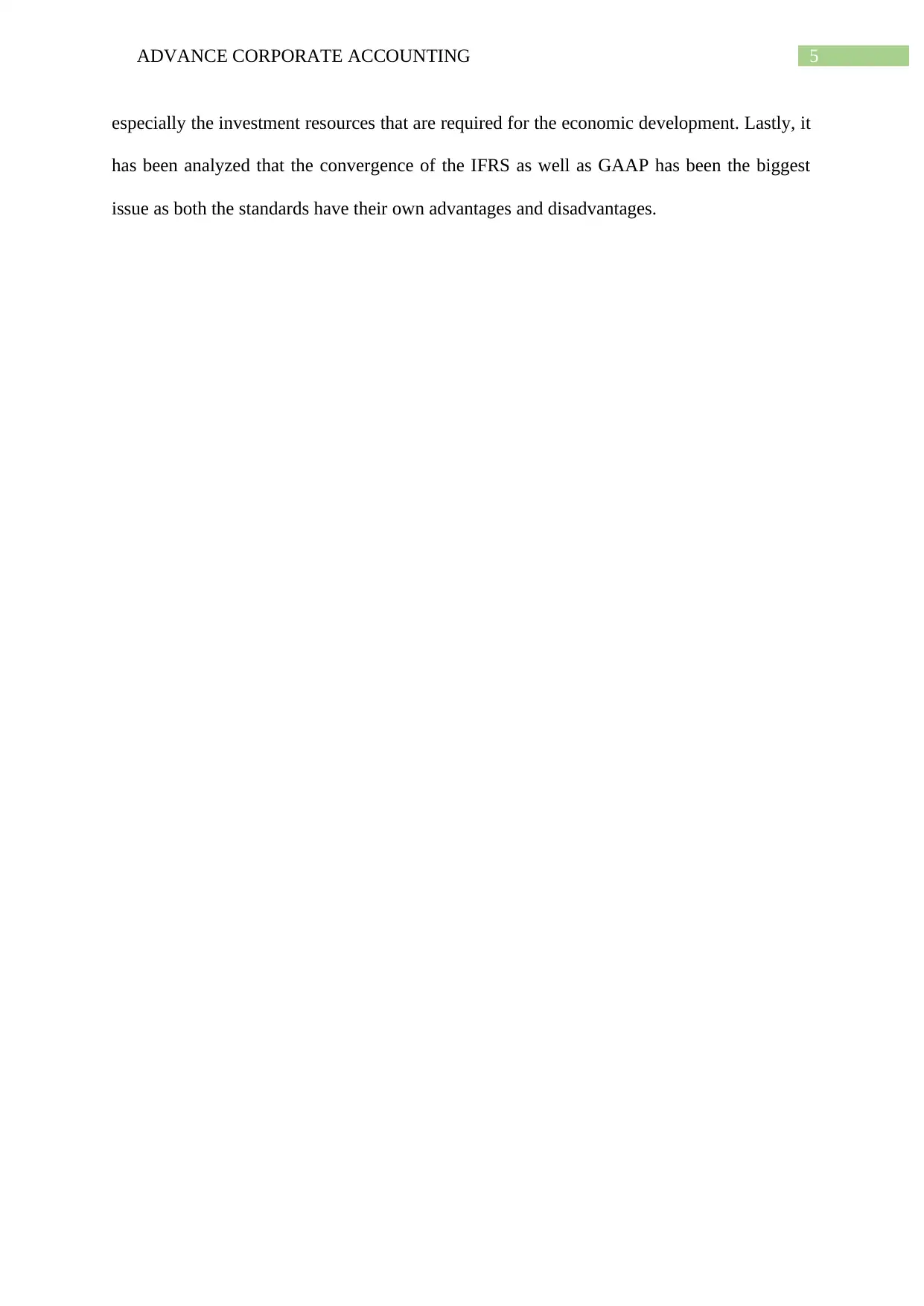
5ADVANCE CORPORATE ACCOUNTING
especially the investment resources that are required for the economic development. Lastly, it
has been analyzed that the convergence of the IFRS as well as GAAP has been the biggest
issue as both the standards have their own advantages and disadvantages.
especially the investment resources that are required for the economic development. Lastly, it
has been analyzed that the convergence of the IFRS as well as GAAP has been the biggest
issue as both the standards have their own advantages and disadvantages.
⊘ This is a preview!⊘
Do you want full access?
Subscribe today to unlock all pages.

Trusted by 1+ million students worldwide
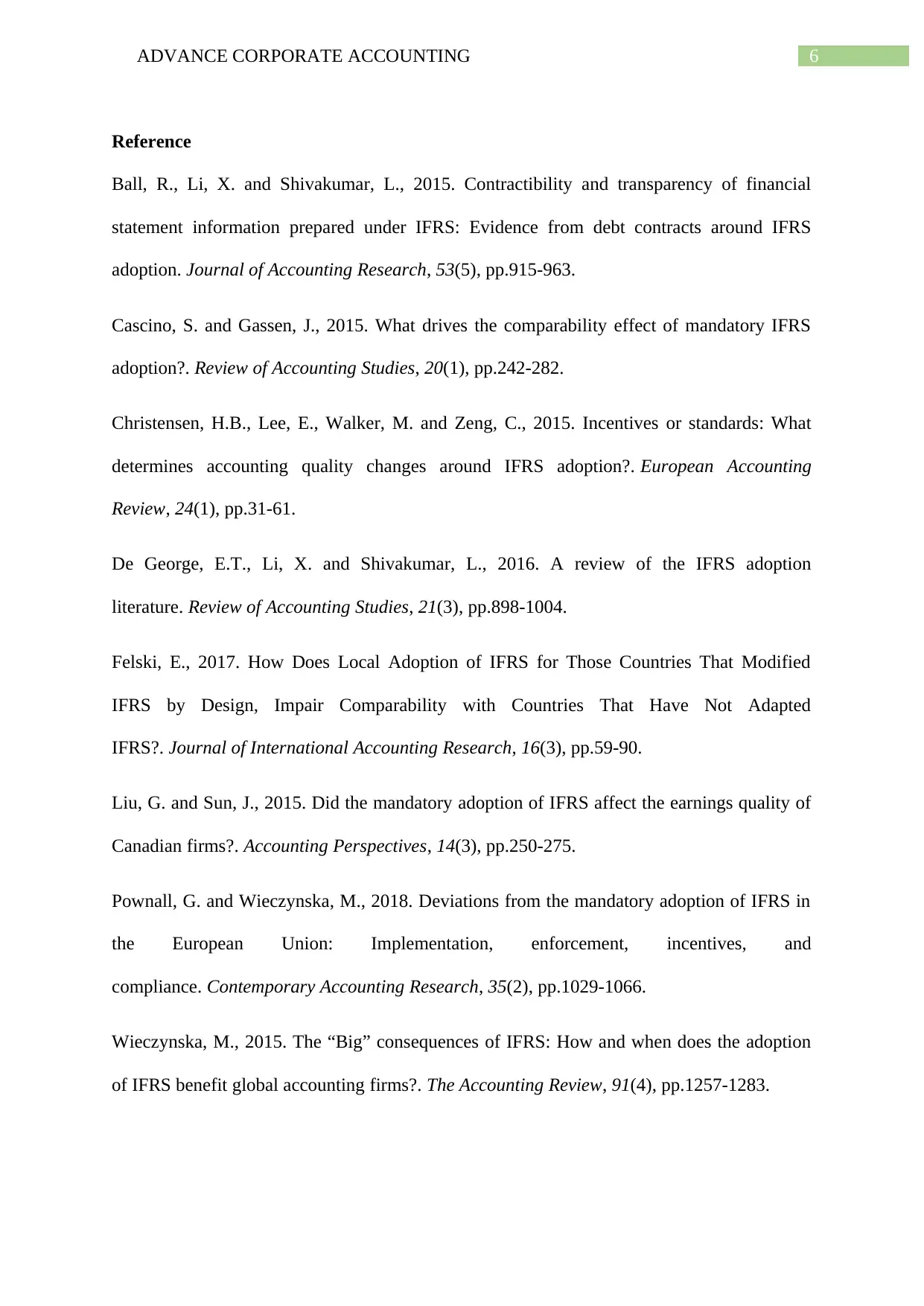
6ADVANCE CORPORATE ACCOUNTING
Reference
Ball, R., Li, X. and Shivakumar, L., 2015. Contractibility and transparency of financial
statement information prepared under IFRS: Evidence from debt contracts around IFRS
adoption. Journal of Accounting Research, 53(5), pp.915-963.
Cascino, S. and Gassen, J., 2015. What drives the comparability effect of mandatory IFRS
adoption?. Review of Accounting Studies, 20(1), pp.242-282.
Christensen, H.B., Lee, E., Walker, M. and Zeng, C., 2015. Incentives or standards: What
determines accounting quality changes around IFRS adoption?. European Accounting
Review, 24(1), pp.31-61.
De George, E.T., Li, X. and Shivakumar, L., 2016. A review of the IFRS adoption
literature. Review of Accounting Studies, 21(3), pp.898-1004.
Felski, E., 2017. How Does Local Adoption of IFRS for Those Countries That Modified
IFRS by Design, Impair Comparability with Countries That Have Not Adapted
IFRS?. Journal of International Accounting Research, 16(3), pp.59-90.
Liu, G. and Sun, J., 2015. Did the mandatory adoption of IFRS affect the earnings quality of
Canadian firms?. Accounting Perspectives, 14(3), pp.250-275.
Pownall, G. and Wieczynska, M., 2018. Deviations from the mandatory adoption of IFRS in
the European Union: Implementation, enforcement, incentives, and
compliance. Contemporary Accounting Research, 35(2), pp.1029-1066.
Wieczynska, M., 2015. The “Big” consequences of IFRS: How and when does the adoption
of IFRS benefit global accounting firms?. The Accounting Review, 91(4), pp.1257-1283.
Reference
Ball, R., Li, X. and Shivakumar, L., 2015. Contractibility and transparency of financial
statement information prepared under IFRS: Evidence from debt contracts around IFRS
adoption. Journal of Accounting Research, 53(5), pp.915-963.
Cascino, S. and Gassen, J., 2015. What drives the comparability effect of mandatory IFRS
adoption?. Review of Accounting Studies, 20(1), pp.242-282.
Christensen, H.B., Lee, E., Walker, M. and Zeng, C., 2015. Incentives or standards: What
determines accounting quality changes around IFRS adoption?. European Accounting
Review, 24(1), pp.31-61.
De George, E.T., Li, X. and Shivakumar, L., 2016. A review of the IFRS adoption
literature. Review of Accounting Studies, 21(3), pp.898-1004.
Felski, E., 2017. How Does Local Adoption of IFRS for Those Countries That Modified
IFRS by Design, Impair Comparability with Countries That Have Not Adapted
IFRS?. Journal of International Accounting Research, 16(3), pp.59-90.
Liu, G. and Sun, J., 2015. Did the mandatory adoption of IFRS affect the earnings quality of
Canadian firms?. Accounting Perspectives, 14(3), pp.250-275.
Pownall, G. and Wieczynska, M., 2018. Deviations from the mandatory adoption of IFRS in
the European Union: Implementation, enforcement, incentives, and
compliance. Contemporary Accounting Research, 35(2), pp.1029-1066.
Wieczynska, M., 2015. The “Big” consequences of IFRS: How and when does the adoption
of IFRS benefit global accounting firms?. The Accounting Review, 91(4), pp.1257-1283.
1 out of 7
Related Documents
Your All-in-One AI-Powered Toolkit for Academic Success.
+13062052269
info@desklib.com
Available 24*7 on WhatsApp / Email
![[object Object]](/_next/static/media/star-bottom.7253800d.svg)
Unlock your academic potential
Copyright © 2020–2026 A2Z Services. All Rights Reserved. Developed and managed by ZUCOL.




